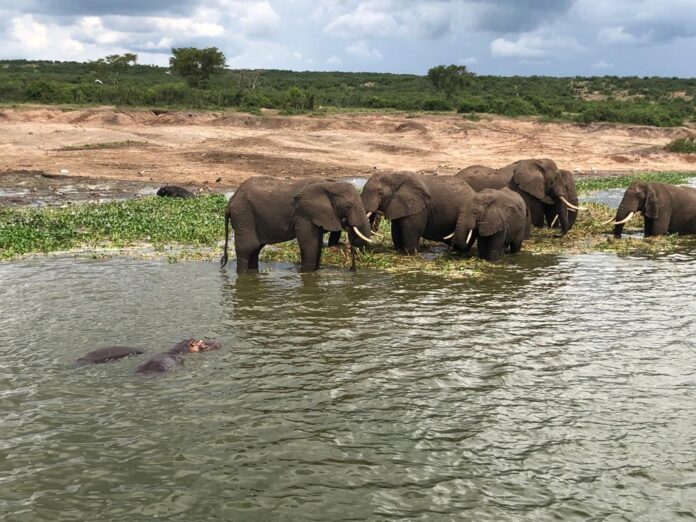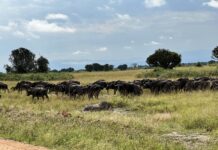Uganda is one of the very few most spectacular countries in the world and it is without doubt, a treasured travel destination by nature lovers. Located in the heart of Africa, Uganda is a landlocked state and prides itself of a lush vegetation and abundant wildlife. It is strategically positioned astride the Equator, and surrounded by other East African countries including Rwanda in the Southwest, Tanzania in the South, Democratic Republic of Congo in the West, Kenya in the East and South Sudan in the North.
Uganda lies at the elevation of about 1000 meters, and features generally gentle and hilly landscape. Over 25% of the country’s landscape area is comprised of Rivers, Lakes, and Swamps –with the world’s freshest water Lake Victoria lying right here as well as the Source of the Nile River. Uganda’s breathtaking landscape also consists of scenic Volcanoes and block mountain ranges including Mount Elgon, Virunga Volcanoes (Gahinga, Muhabura & Sabyinyo). These are among the unique attractions that visitors should expect to explore on Uganda safaris.
Why travel to Uganda in 2023/2024? Amazing reasons why Uganda should be your bucket-list African safari destination.
- Uganda holds up to half of the remaining 1063 endangered mountain gorilla population. These are sheltered in the country’s 2 gorilla safari parks- Bwindi Impenetrable National Park and Mgahinga Gorilla National Park. The huge mountain gorilla population has resulted in the habituation of many gorilla groups with Uganda alone featuring 21 gorilla families set for gorilla trekking.
- The Source of the World’s longest River – the Nile River is available in Uganda- the Pearl of Africa. Exploring the Source of the Nile River is best while on the Jinja tour where tourists enjoy thrilling adrenaline adventures such as whitewater rafting, kayaking, jet-boating, bungee jumping, boat cruise, and more.
- Abundant wildlife, including all the big five game –all spotted in their natural habitat. The diverse animal species to encounter on Uganda safaris include the bush elephants, cape buffaloes, rhinos, lions, leopards, antelopes (including roan antelopes, waterbucks, bushbucks, hartebeests, oribis, klipspringers, Uganda kobs, elands, topis and more), caracals, jackals, cheetahs, and others.
- Diversity of birds –priding itself of 0ver 1,000 bird species –Uganda is truly a birder’s haven. The birds of Uganda include ostriches, goliath heron, African darter, pelicans, saddle-billed storks, shoebill stork, flamingoes, African fish eagles, secretary bird, bateleurs, palm nut vultures, Jackson’s francolins, helmeted guinea fowl, ross’s turacos, African emerald cuckoos, Eastern grey plantain-eaters, standard-winged nightjars, verreaux’s eagle-owl, broad-billed rollers, Northern carmine bee-eaters, malachite kingfishers, Abyssinian ground hornbill, white-browed robin chat, Double-toothed barbet, African paradise flycatchers, scarlet-chested sunbird, silver bird, Black-winged red bishop, pia-piac, fork-tailed drongo, red-cheeked cordon-bleu, African fin-foot, pin-tailed whydah, African green broadbill, African green breasted pitta, Great blue turacos, Shelley’s crimson wings, and many others.
- Distinct cultural heritage –Uganda has over 50 local tribes and each has its own unique culture and traditions.
Uganda’s currency
Like most destinations, lodges, hotels, tour companies and tourism tariffs are quoted in US Dollars. Credit card payments are acceptable and for easy transactions in the local markets, you will need Uganda Shillings (UGX). You can exchange your foreign currency at the bank or any available forex bureau in Kampala city or other towns and cities. When searching for a forex bureau to exchange your money, please be careful of fraudsters and better if you did it with guidance from your tour operator/safari leader.
Health & vaccination
Uganda is a safe destination for tourists to explore although some safety measures must be adhered to, especially against some infectious diseases. This means you will need to take vaccination more so on Hepatitis B, yellow fever, polio, tetanus, typhoid, and measles. While on a safari in Uganda, avoid eating contaminated food or drinking water from unhygienic areas. Sleep under treated mosquito net and have an insect repellent, wear long trousers, long-sleeved shirts and more. Don’t wear black and blue clothes, especially in places with tsetse flies as they attract them. Make the best use of sunscreen to protect you from the hot sun. Use prescribed medication where need be while on a safari tour in Uganda.
Passports and visas
Visas and passports are some of the essentials for visitor entry into Uganda. Processing visas is easier for tourists with plans to explore Uganda and this can be done online. It is possible to secure a Uganda visa from the Uganda Embassies and missions back in your home country or upon arrival at the Entebbe International Airport (EBB) and border entry point. A form must be filled with passport dates and details. The countries that can apply for and obtain visas online include Denmark, Russia, USD, South Africa, China, Italy, India, Japan, France, Belgium –citizens from these states can download the application from the embassy website in their respective homes.
States that don’t need visas include Swaziland, Burundi, Eritrea, Zambia, Rwanda, Seychelles, Mauritius, Comoros, Madagascar, Kenya, Tanzania, Angola, Malawi, Solomon Islands, Lesotho, Jamaica, Barbados, Gambia, Singapore, Bahamas, Gambia, Antigua, etc.
Visa fees– East African tourist visas are available at USD 100 valid for 3 months for multiple entries to East African states such as Rwanda, Kenya and Uganda. Multiple entry visas valid for 6 months at USD100 for business travelers.
The weather & climatic conditions
Nothing makes Uganda a preferred African safari destination like its cool weather conditions. Lying on an elevation of 1000 meters, Uganda records an average annual temperature range of 25-30 degrees celsius. These temperatures drop down to 15 to 20 degrees during the night. The wet months of the year inclue; March, April, May and October to November while the dry season begins from December to February and June to September.
Safari destinations in Uganda
Uganda has plenty of amazing destinations for nature lovers to explore. These include Lake Mburo National Park, Bwindi Impenetrable National Park, Queen Elizabeth National Park, Murchison Falls National Park, Kibale National Park, Mgahinga Gorilla National Park, Semuliki National Park, Rwenzori Mountains National Park, Mount Elgon National Park. There is an emerging trend where visitors hire a 4×4 with a rooftop tent and explore the different safari destinations in the country. They are not worried of where the night finds them because they sleep in the tent on top of the car.
What to carry
Pack light for your Uganda safari trip. On the packing list, begin with essentials such as long-sleeved shirts, long trousers, a sweater, a rain jacket, a day-pack, passports, visas, sunscreen, insect repellents, cameras, waterproof hiking boots or shoes, a money belt, and others.






